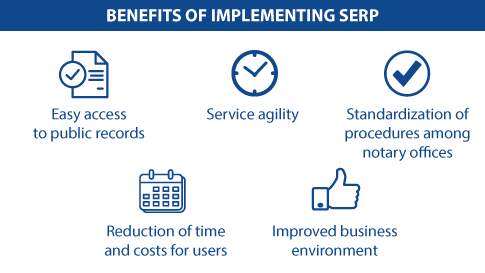Securities Commission publishes new regulatory framework for public offerings
18/07/2022Federal Revenue Service abolishes Dirf as of 2024
22/07/2022EXPERT OPINION
Modernization of notarial services introduces changes on several levels
New statute brings Brazil closer to international standards by increasing the efficiency of services provided by notary offices
By Amanda Martines
Brazil has taken another step towards cutting red tape by defining new rules for notary procedures. Published at the end of June, Law No 14,382/2022 created the Electronic System for Public Records (“Sistema Eletrônico de Registros Públicos” - Serp), which will interconnect the databases of more than 13,000 notary offices all over the country.
The new system should be implemented by January 31, 2023, which is the due date set for this online and standardized service to be in place for individuals and companies.
The measure is expected to benefit citizens and add to the simplification of the Brazilian business environment, placing the notary sector more in line with a global digital market.
This effort brings the country closer to international standards adopted by the world’s largest economies. In this respect, the digital transformation boosts Brazil's appeal towards foreign investors.

How will the system work?
Serp will be run as a digital platform gathering the data registered with notary offices, allowing for the exchange of documents, issuance of certificates and provision of information in digital format.
All notary offices will be interconnected, and registration will be mandatory for all establishments.
The system will be operated nationwide by a non-profit civil entity, under the regulation of the Disciplinary Board of the National Council of Justice (CNJ).
What changes will Serp bring to users?
Under the current model, the records of a single user are scattered among notary offices, which hampers the access to information and renders in-person attendance a requirement for making requests. This scenario leads to increased costs and paperwork, slowing down efforts for business development.
In practice, this new operational model will cut down on time and costs, as users will no longer be required to travel from one notary office to another. Services can be performed via cell phone or computer.
With the enactment of the new statute, users will be exempt from notarizing documents and instruments. In addition, a number of services will be performed within a shorter period of time, ensuring greater efficiency.
Benefits of implementing Serp

Use of electronic signatures
According to the statute, accessing or submitting information to public records over the Internet requires the use of an advanced or qualified electronic signature.
It should be noted that the qualified signature model offers greater security, as it is linked to the ICP-Brazil digital certificate, an electronic identification document for individuals and legal entities.
Changes to the Civil Code
Law No 14,382/2022 also promoted changes to the Civil Code. Among the amendments, the following stand out:
- General meetings of private companies can now be held via electronic means, provided that each shareholder’s rights to attend, speak and vote are observed.
- Limited-liability proprietorships (“Eirelis”) have been removed from the list of legal entities governed by private law, as Law No 1,495/2021 had turned them into single-member limited liability companies.
- The registration address has been defined for cases in which the business activity is performed electronically. Depending on the case, the address may be that of the sole proprietor or that of one of the partners of the business company.
Support for individuals and companies
The Paralegal Department at Domingues e Pinho Contadores' provides support to individuals and companies in dealing with notary offices to obtain certificates and comply with public records regulations.
In addition, DPC is a registration authority (RA) accredited for the issuance and renewal of digital certificates, an important tool for the electronic authentication of identities in an increasingly digital business environment. You can rely on this support: dpc@dpc.com.br

Author: Amanda Martines, partner at Domingues e Pinho Contadores.
How DPC may help your company?
Domingues e Pinho Contadores has specialized team ready to assist your company.
Contact us by the e-mail dpc@dpc.com.br
See more
Sign up for our Newsletter:
Are you interested?
Please contact us, so we can understand your demand and offer the best solution for you and your company.

Rio de Janeiro
Av. Rio Branco 311, 4º e 10º andar - Centro
CEP 20040-903 | Tel: +55 (21) 3231-3700
São Paulo
Rua do Paraíso 45, 4º andar - Paraíso
CEP 04103-000 | Tel: +55 (11) 3330-3330
Macaé
Rua Teixeira de Gouveia 989, sala 302 - Centro
CEP 27910-110 | Tel: +55 (22) 2773-3318
EXPERT OPINION
Modernization of notarial services introduces changes on several levels
New statute brings Brazil closer to international standards by increasing the efficiency of services provided by notary offices
By Amanda Martines
Brazil has taken another step towards cutting red tape by defining new rules for notary procedures. Published at the end of June, Law No 14,382/2022 created the Electronic System for Public Records (“Sistema Eletrônico de Registros Públicos” - Serp), which will interconnect the databases of more than 13,000 notary offices all over the country.
The new system should be implemented by January 31, 2023, which is the due date set for this online and standardized service to be in place for individuals and companies.
The measure is expected to benefit citizens and add to the simplification of the Brazilian business environment, placing the notary sector more in line with a global digital market.
This effort brings the country closer to international standards adopted by the world’s largest economies. In this respect, the digital transformation boosts Brazil's appeal towards foreign investors.

How will the system work?
Serp will be run as a digital platform gathering the data registered with notary offices, allowing for the exchange of documents, issuance of certificates and provision of information in digital format.
All notary offices will be interconnected, and registration will be mandatory for all establishments.
The system will be operated nationwide by a non-profit civil entity, under the regulation of the Disciplinary Board of the National Council of Justice (CNJ).
What changes will Serp bring to users?
Under the current model, the records of a single user are scattered among notary offices, which hampers the access to information and renders in-person attendance a requirement for making requests. This scenario leads to increased costs and paperwork, slowing down efforts for business development.
In practice, this new operational model will cut down on time and costs, as users will no longer be required to travel from one notary office to another. Services can be performed via cell phone or computer.
With the enactment of the new statute, users will be exempt from notarizing documents and instruments. In addition, a number of services will be performed within a shorter period of time, ensuring greater efficiency.
Benefits of implementing Serp
INFOGRÁFICO
Use of electronic signatures
According to the statute, accessing or submitting information to public records over the Internet requires the use of an advanced or qualified electronic signature.
It should be noted that the qualified signature model offers greater security, as it is linked to the ICP-Brazil digital certificate, an electronic identification document for individuals and legal entities.
Changes to the Civil Code
Law No 14,382/2022 also promoted changes to the Civil Code. Among the amendments, the following stand out:
General meetings of private companies can now be held via electronic means, provided that each shareholder’s rights to attend, speak and vote are observed.
Limited-liability proprietorships (“Eirelis”) have been removed from the list of legal entities governed by private law, as Law No 1,495/2021 had turned them into single-member limited liability companies.
The registration address has been defined for cases in which the business activity is performed electronically. Depending on the case, the address may be that of the sole proprietor or that of one of the partners of the business company.
Support for individuals and companies
The Paralegal Department at Domingues e Pinho Contadores' provides support to individuals and companies in dealing with notary offices to obtain certificates and comply with public records regulations.
In addition, DPC is a registration authority (RA) accredited for the issuance and renewal of digital certificates, an important tool for the electronic authentication of identities in an increasingly digital business environment. You can rely on this support: dpc@dpc.com.br.
How DPC may help your company?
Domingues e Pinho Contadores has specialized team ready to assist your company.
Contact us by the e-mail dpc@dpc.com.br
See more
Sign up for our Newsletter:
Are you interested?
Please contact us, so we can understand your demand and offer the best solution for you and your company.

Rio de Janeiro
Av. Rio Branco 311, 4º e 10º andar - Centro
CEP 20040-903 | Tel: +55 (21) 3231-3700
São Paulo
Rua do Paraíso 45, 4º andar - Paraíso
CEP 04103-000 | Tel: +55 (11) 3330-3330
Macaé
Rua Teixeira de Gouveia 989, sala 302 - Centro
CEP 27910-110 | Tel: +55 (22) 2773-3318







